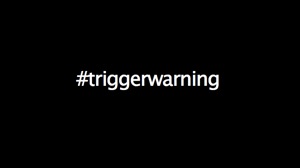
Help me understand something. What is going on with what seems to be a growing trend where atheist bloggers, as well as others communicating online, attempt to warn their audience of certain kinds of material with the phrase "trigger warning," often in caps or set off in some way?
I'm seeing it quite a bit lately, particularly on blogs focusing on gender issues. I am well aware that such warnings have a history in certain feminist circles, usually to warn emotionally vulnerable individuals (e.g., rape victims) of content that is likely to be upsetting. I get that, but it seems like this warning is now being used so inconsistently on so many different subjects and with such a diverse audience that I'm not sure what meaning it is supposed to have. Besides, I have a very difficult time believing that the audience of the average atheist blogger is truly as fragile as the bloggers seem to think they are.
I've written about all sorts of potentially objectionable subjects here, ranging from criticism of the religious beliefs cherished by many to the sexual abuse committed by clergy. I've written about sexism, racism, homophobia, and anti-atheist bigotry. It has never occurred to be to preface what I write with "trigger warning."
Why not? First, I recognize that triggers are so person-specific that there is no way I could anticipate all of them. This is a blog on atheism, not an online community for people suffering from a particular mental illness of trauma history. Second, it strikes me as more than a little sexist to selectively use trigger warnings whenever I say anything about sexism or feminism. I'd rather not make global assumptions about women being excessively fragile. Third, I write for a primarily atheist audience, and I assume that most people who are strong enough to be atheists can probably handle reading about anything I might write. And finally, I reject the notion that shielding people from reality is wise. Some aspects of reality are unplesant and need to change.
Am I making a mistake by assuming that my audience is composed of people with at least some distress tolerance? I don't think so. If I were to view you as excessively fragile, so much so that I thought you needed these types of warnings, wouldn't I be underestimating your resilience? Wouldn't I be guilty of infantilizing you, at least to some degree? And wouldn't that be just a bit demeaning? I mean, we're in this together. You have undoubtedly experienced pain; we all have. Am I really going to traumatize you with my words?